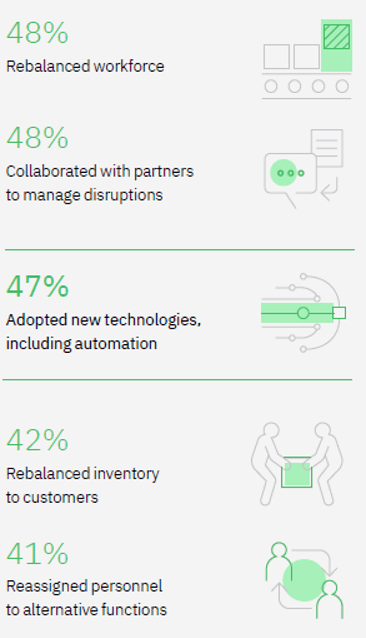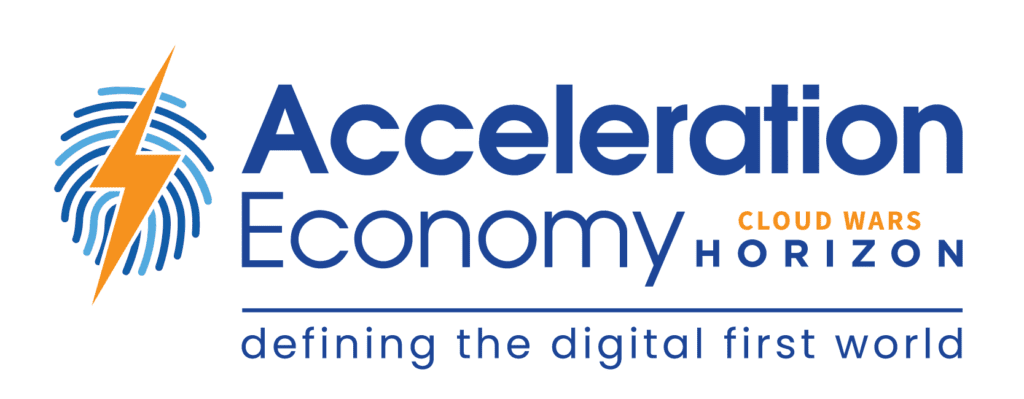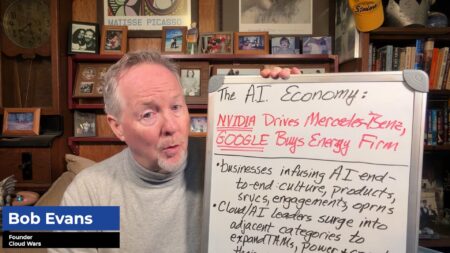Following the epic disruption wrought by Covid-19, inflation, war, and other factors that have hit the global economy in the past 30 months, it wouldn’t be too surprising if supply chain leaders were primarily focused on keeping their heads above water and trying to contain future damage.
Instead, there’s evidence they’re taking a proactive, aggressive stance and forging ahead with digital initiatives. “Supply chain can’t just be a cost center. It’s got to be an enabler of growth,” says Colgate-Palmolive Chief Supply Chain Officer Mike Corbo in a new report on supply chain leaders’ tech and business priorities. “Manage the present; shape the future. We live in both camps,” Corbo adds. “Digital transformation will ignite and will help. I think that future states have to be fluid and dynamic.”
Join us Nov. 15-17 for Cloud Wars Horizon Week, a digital event analyzing the business and IT imperatives around cloud, AI, automation, and cybersecurity, as well as the innovative companies asserting leadership in these areas.
Corbo’s insights, and those of 1,500 fellow Chief Supply Chain Officers (CSCO) and Chief Operating Officers (COOs), are contained in an IBM Institute for Business Value Report titled “Own your transformation; Data led innovation for the modern supply chain.” It’s one of the first forward-looking reports I’ve seen that delves into where supply chains, following the struggles of recent years, go next.
Supply Chain Issues Abound
The most optimistic leaders with the greatest tolerance for turmoil would be challenged to maintain calm with everything they’ve faced in recent years. This report puts hard data around the causes of the supply chain disruptions they’ve lived through:
- 46% of respondents reported challenges resulting from demand volatility
- 46: logistics (ships, trucks, drivers) availability
- 45%: supply base inventory availability
- 42%: technology adequacy
- 41%: availability of skilled labor
- 38%: wage inflation
“There has been a consistent flow of serious events for the last three years with Covid, extreme weather, logistics challenges, war, etc.,” says Dow Inc. CSCO Greg Jozwiak. “In many respects, all our supply chain teams have been delivering heroic efforts to keep products moving.”
Despite such heroic efforts — and others have similarly lauded the work that has taken place — industries such as retail and manufacturing have experienced massive disruption, inventory imbalances, inability to fulfill customer orders, and more.
Tech Solutions
Since no one can predict when the aforementioned issues will become a thing of the past, the report delivers solid insight into where CSCOs and COOs, as they look ahead, are placing their bets, both from a business perspective and a technology perspective.
To this point, leaders say they have employed a series of steps to address the disruptions that have occurred — ranging from technology adoption to workforce adaptations to new ways of engaging with partners.
Specifically, 47% of the 1,500 surveyed have turned to new technologies including automation, 48% have rebalanced their workforce, and 48% have worked collaboratively with partners to address supply chain disruptions. The full set of responses is below:

Some of the strategies employed by supply chain leaders include embracing new technologies (automation), increasing partner collaboration, and rebalancing their workforce.
Drilling more deeply into technology and specific platforms that have been employed today, the research found that rates of implementation when it comes to automation are as follows:
- Predictive analytics: 25%
- Workflow management: 21%
- Recommendation engines: 17%
In the area of workflow technologies, rates of implementation are:
- Execution management: 21%
- Process and task mining: 19%
Business Priorities
The researchers queried respondents specifically on their top business priorities over the next two to three years. The good news is that these respondents in large measure are thinking about how their work impacts customers and how they can bring innovation to bear.
In fact, the highest percentage of respondents, 52%, said their top priority is to deliver better customer experiences. A skeptic might say that’s no surprise considering so many customers were disappointed by the supply chain disruptions of recent years. Or, you could view that finding more positively, as an indicator that CSCOs are hanging tough and keeping the customer’s needs in mind while being under duress. Another 45% said they are looking to deliver more innovation in their business models, and one could easily conclude that would be customer-facing innovation that supports Priority 1.
Other responses to the business priority question:
- 49%: improving efficiency or profitability
- 45%: increasing sustainability
A related question asked what actions respondents are taking to manage risk to their business — supply chain disruption being a prime example of the types of risks they hope to avoid in the future.
For risk mitigation considerations, 54% of CSCOs are employing predictive approaches and technology and adding technology into their workflows. 52% are accelerating investments in digital technologies, including digitization of processes. Another 48% are applying innovation with business partners.
Closing Thoughts
One might wonder, given all the disruptions of recent years, whether all of these tech and business initiatives surrounding the supply chain can really pay off. After all, many companies have invested heavily in this area and few, if any, were able to escape the disruptions that have roiled the global economy.
There’s a critical finding that speaks to the value of these investments quite specifically. Those companies that the research labels “innovators” (they employ data-driven strategies and leverage hybrid cloud, AI-enabled workflows, customer-focused sustainability, and cybersecurity) work for companies that had 11% more annual revenue growth than those that didn’t achieve an Innovator designation.
That’s one clear indicator that there’s no better time than now to position your company for business model innovation that brings you closer to your customers and gets your supply chain humming again.
For more exclusive coverage of innovative cloud companies, check out Cloud Wars Horizon here:









